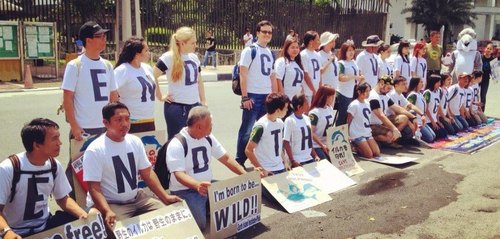See on Scoop.it – Makamundo (Earthly)

Joining the call of various environmental groups to protect dolphins and whales, Kabataan Partylist Rep. Raymond Palatino has filed a resolution in Congress urging the Department of Education (DepED) and Commission on Higher Education (CHED) to ban school field trips to theme parks that possess captive dolphins and whales that come from “cruel and inhumane sources.”
The youth solon filed on September 5 House Resolution No. 2759, calling for the House of Representatives to direct DepEd and CHED to prohibit such type of field trips.
“School field trips are designed to expand the students’ learning through live interaction. However, dolphin and whale shows teach children the wrong values that keeping wild animals in captivity is acceptable,” Palatino said.
In several researches, including a government-commissioned study in the United Kingdom, it was shown that watching dolphins perform in marine parks generate no significant knowledge about the said animals, Palatino said. “The prime target of ocean parks with captive dolphins and whales are students, when in fact there is not much to learn from these facilities,” he added.
“What’s more, the demand for captive whales and dolphins is the primary motivation behind the deadly dolphin and whale hunts in various countries, including Japan and the Solomon Islands,” Palatino explained.
Several non-profit organizations, including Earth Island Institute Philippines, have raised concerns on the said dolphin and whale hunts that have grossly decreased the number of said animals in the past years.
In Taiji, Japan, annual dolphin killings occur in September of every year. Fishermen try to catch “good-looking” dolphins which they sell to marine parks. Once the nicer looking animals are chosen, the rest of the catch is slaughtered. In 2007, a record 1,239 dolphins and whales were caught in such hunts, with most of the animals ending up being slaughtered.
Dolphins and whales from Japanese hunts have reportedly found its way into the Philippines, despite the enactment of Republic Act 8485 or the Animal Welfare Act, which bans and punishes any kind of torture and maltreatment of any animal, and the Fisheries Administrative Order 185 which prohibits the catching, killing and mere possession of dolphins in the Philippines.
“Various studies have also shown that keeping dolphins and whales in captivity also shortens the life span of these animals,” Palatino said. In Ocean Adventure Park in Subic, four out of five false killer whales and a bottlenose dolphin used for performances have already died. All of these animals were from Japan.
“Is this what we want our youngsters to learn – that people would risk endangering the lives of endangered animals just for entertainment? The nation’s youth deserves the right to be informed correctly and protected from misleading facts,” Palatino said.
“DepEd and CHED have moral obligations to ensure that students learn the real value of environmental conservation, and holding field trips in ocean parks is simply not the way to teach such,” Palatino added.###
See on kabataanpartylist.com




